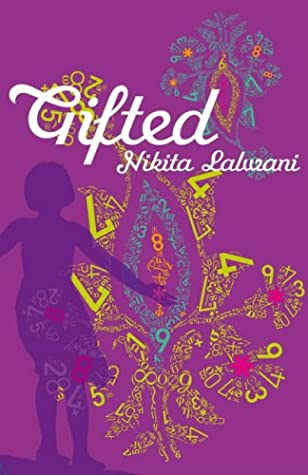After the announcement of the Booker longlist, Gifted by Nikita Lalwani was the first of the thirteen that I picked up in my eagerness to find out what the chosen few were about. Had it not made the longlist I have no doubts that I would never have picked it up. The cover, you see, is rather ugly. If I were to hazard a guess at what it’s supposed to be then it’s a silhouette of a girl coupled with some stylized cumin, formed from numbers and other mathematical symbols. Gifted, it seems, does not extend to the minds behind this artistic faux pas.
But, as the old adage goes, one must not judge a book by its cover so it was between the pages of this, Lalwani’s debut novel, that I went. At first I wondered if this may have been a chicklit novel, but then, I’ve never read chicklit, so I have no way of knowing. But, beyond such notions, there’s a powerful story half-heartedly trying to get out.
Rumi Vasi is a child prodigy who, from an early age, has shown an aptitude for numbers, something which her father, Mahesh, is only too keen to progress. Originally from India, having taken a university position in Cardiff, he views Rumi’s success in their new country with great importance. To him, it’s about making an impact on society. So it goes that Rumi’s studies are manipulated by her overbearing father to the point where she has no friends and even spends Saturday nights practicing arithmetic.
Gifted follows the Vasi family over the following nine years as Rumi grows up wanting to be like another other kid but being controlled by the strict rules of her Indian household. Eventually, as was her father’s aim, she attains a bit of celebrity by entering Oxford University at a young age. But the seeds sown by Mahesh come back to haunt him when he realises that trying to protect someone from outside influences can lead to them being damaged by smothering love.
Gifted‘s prose has a personality to it, leaping from a series of paragrahs into sections of lists then back to straight prose. Through this Lalwani gives us the character of Rumi, initially excited about mathematics, although there are hints that this enthusiasm is never going to last:
Under the burning tube lights, she attacked the numbers with speed and ferocity, as though she were playing Space Invaders, devouring the figures with the hunger in her belly and spitting out the remains. She worked feverishly, chewing pen tops down to sharp points. Then she had looked up – looked at the bored librarian at her desk, at the old man reading the paper – seen the thin tall rectangle of black sky through the doors and trembled with loneliness.
The problem I had is that Rumi is probably the least interesting character in the book. As she sits down to some calculus or rebels against it, her passage to Oxford has an air of artificiality about it. I’m even surprised that she got into such an establishment as her father’s guidance was limited to mathematics and there’s scant mention of her ability in other disciplines, such as English and history:
She felt stupid, devoid as she was of vocabulary for history – architecture, epic battles, eras, wars, kings and queens – none of it understood.
The conflict between Rumi’s parents, Mahesh and Shreene, provide the interesting parts of the novel although when the focus finally switches to them it’s a case of too little, too late. While Mahesh want’s nothing more than Rumi’s success in their adopted country, her mother judges her actions against the customs of the India she loves. It’s a sad affair that Mahesh is portrayed as the stern, father of few words, when in his daughter’s company and it’s only when the device of Whitefoot, a Scottish contemporary of Mahesh, is brought into the story that we get him waxing lyrical and sharing his opinions.
As a debut Gifted introduces Lalwani to us as a writer of promise but certainly not the finished article. While this novel approaches an interesting topic in heavy handed parenting it is full of characters uncomfortably dropped into the restrictions of a predetermined storyline. I doubt this will feature in the eventual shortlist but if it does I’m ready to eat humble pi.

Hehe at your last line. And have you really never read chicklit?
I agree that the cover is a bit ugly, and I would probably never pick it up either, and still probably won’t, despite the whole maths “enthusiasm” really appealing to me. The relationship structures you describe sounds a bit tedious, and typical. Nice review though.
Some of the things you mentioned are the very reason I liked the book :). Like the father being a different person when with his family. I hate to generalize but there are parts to his personality that are so true to Indian fathers in that era. The importance of education in India’s ever growing competitive market was completely ingrained in them. Same for the mother. I’m just glad we are past the phase where excellence in studies is the only guarantee for success in life.
chica, I honestly can’t remember this book too well now. Even with a review above, there’s little of it that sticks in the memory. As for the father, if I remember correctly, it was more that he was two different people. But, depending on the situation, he was a completely different person, with no linking thread between them. As if he was two separate characters, rather than the same person where one incarnation is put on.
Nikita Lalwani’s Gifted has won the inaugural Desmond Elliott Prize, worth a cool £10,000. With a woman winning another literary prize, it’s at least another argument against the relevance of the Orange Prize.